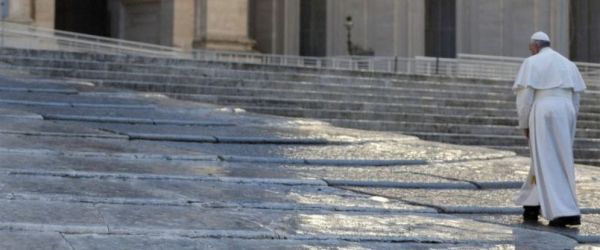Job, defeated, or rather, at the end of his life due to illness, with his skin stripped away, nearly at the point of death, almost without flesh, Job has a certitude and he states it: “I know that my Redeemer lives, and at last he will stand upon the earth” (Jb 19:25). At the moment in which Job is at his very lowest, there is that embrace of light and warmth that reassures him: I will see the Redeemer. I will see him with these eyes. “I shall see God, whom I shall see on my side, and my eyes shall behold, and not another” (19:26-27).
This certainty, precisely at nearly the final moment of life, is Christian hope. It is a hope that is a dream: we cannot have it. It is a gift we must ask for: ‘Lord, give me hope’. There are many bad things that lead us to despair, to believe that all will be a definitive loss, that after death there will be nothing... And Job’s voice returns; it returns: “I know that my Redeemer lives, and at last he will stand upon the earth... I shall see God, whom I shall see on my side”, with these eyes.
“Hope does not disappoint” (Rom 5:5), Paul told us. Hope draws us and gives meaning to our life. I do not see the afterlife, but hope is God’s gift that draws us toward life, toward eternal joy. Hope is an anchor that we have from the other side, and we, grasping the rope, sustain ourselves (cf. Heb 6:18-19). ‘I know that my Redeemer lives, and I shall see him’. And repeat this in times of joy and in bad times, in times of death, let us say this.
This certitude is a gift of God, because we can never have hope by our own efforts. We must ask for it. Hope is a freely given gift that we never deserve: it is given; it is offered. It is grace.
And then, the Lord confirms this, this hope that does not disappoint. “All that the Father gives me will come to me” (Jn 6:37). This is the aim of hope: to go to Jesus. And “him who comes to me I will not cast out. For I have come down from heaven, not to do my own will, but the will of him who sent me” (Jn 6:37-38). The Lord who welcomes us there, where the anchor lies. Life in hope is to live like this: grasping, with the rope in hand, strong, knowing that the anchor is below. And this anchor does not disappoint; it does not disappoint.
Today, in the thoughts of many brothers and sisters who have passed on, it will do us good to look at the cemeteries and to look heavenward. And to repeat, like Job: ‘I know that my Redeemer lives, and I myself will see him. My eyes shall behold him, and not another’. And this is the strength that hope gives us, this freely given gift that is the virtue of hope. May the Lord give it to all of us.
[Pope Francis, homily 2 November 2020]












